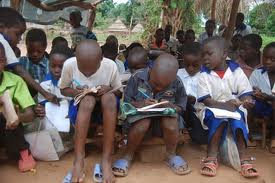 It has become common to discuss charitable giving during the holidays, so I thought I would take advantage of that and talk about one of Saint Paul’s more intriguing statements about charity. He says. “For I do not mean that they should be eased and you burdened; but by an equality, that now at this time your abundance may supply their lack, that their abundance also may supply your lack – that there may be equality.” (2 Corinthians 8.13-14) I find it quite interesting that the state of equality
It has become common to discuss charitable giving during the holidays, so I thought I would take advantage of that and talk about one of Saint Paul’s more intriguing statements about charity. He says. “For I do not mean that they should be eased and you burdened; but by an equality, that now at this time your abundance may supply their lack, that their abundance also may supply your lack – that there may be equality.” (2 Corinthians 8.13-14) I find it quite interesting that the state of equality
isn’t in the position of gifts but in the use of them.
My opinion is that the word that should be used here is fairness and not equality, and I believe that for a variety of reasons I might go into sometime but………………..
We are having a “stand down” with Project 24 and the Mary Okeyo Scholarship trips. Too many terrorist attacks, and too much craziness even in the countryside right now so we are still getting the funds, but the trips are on hold. The Project 24 centers are being supplied but we have placed a “hold” on any new ones until we get a top down review and a direction forward that all partners agree with. There is always an issue for me at least in accountability and it boils down to this question – How do we offer accountability without lording it over those who are recipients of the generosity of Western donors? How can we give aid and do it in a way that is merciful and God pleasing and “just” without creating problems here or there?
This is part of a paper I wrote on justice and accountability and mercy
Luther gives what I think is a good idea of “justice” in a sermon on 1 Corinthians 9,” Later on in the chapter (verses 11-12) Paul explains this fact, saying: “Now these things happened unto them by way of example; and they were written for our admonition . . . wherefore let him that thinketh he standeth take heed lest he fall.” The design of these dealings of God with Israel is to terrify the pride, false wisdom and self-will; to deter men from despising their fellows and from seeking to make the Word of God minister to their own honor or profit in preference to the honor and profit of others. The intent is to have each individual put himself on an equality with others, each to bear with his fellow, the weak enduring the strong, and so on, as enjoined in the four chapters.[1]
Aid in emerging world countries is looked upon more and more as “justice” or the nature and will of God. Lionel Young has written in A “New Breed of Missionaries”: Assessing Attitudes Toward Western Missions at the Nairobi Evangelical Graduate School of Theology. That emerging world countries are looking at AID not just in terms of justice, but strategic mission thinking.[2]
The challenge in the West will be to convince evangelicals, who are often more passionate about planting churches than taking care of orphans and widows, that a larger percentage of Western money should be allocated to help their impoverished brothers and sisters in the Majority World. If this is accomplished, other questions remain. How can sharing be done without promoting a “dependency syndrome”? How do we offer accountability without lording it over those who are recipients of the generosity of Western donors? Mission agencies that are struggling to find their niche in the new global market may want to consider retooling in order to position themselves as specialists who help guide the process of partnership. If mission agencies can make these difficult changes, the wisdom and knowledge they have gained from their years of work out in the field could prove to be invaluable to the development of strategic partnerships. If they do not change, they will quickly become irrelevant. The African leaders and students I interviewed believed that if we are truly the body of Christ, we must find a way to share resources so that “there may be equality” (2 Cor. 8:14 KJV). As Isaac M. T. Mwase observes, “What world Christianity has to figure out is how to have interdependent relationships that are healthy and mutually rewarding. There are pitfalls to be sure, but rather than preventing us from being generous, they should call us to be wise in our generosity. In the words of one student, “All resources, both human and financial, belong to the kingdom and should be used faithfully for the kingdom.”[3]
[1] from volume VII:93-103 of The Sermons of Martin Luther, published by Baker Book House (Grand Rapids, MI). It was originally published in 1909 in English by The Luther Press (Minneapolis, MN), as Luther’s Epistle Sermons, vol. 2.
[2] International Bulletin of Missionary Research, Vol. 36, No. 2
[3] Chinua Achebe, Things Fall Apart (New York: Anchor Books, 1994), p. 143.

